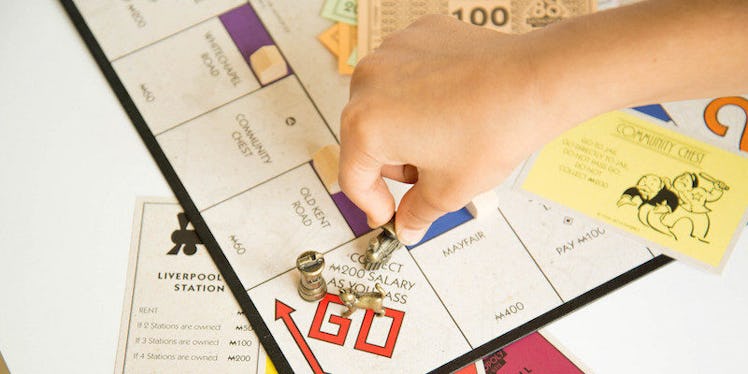
6 Depressing Life Lessons Kids Learn From Classic Board Games
Over the past few years, the phrase "I drank a lot of something somewhere" could be used to describe most of my weekends, and based on how I feel most Mondays, my body (specifically liver) is getting increasingly tired of the same old routine.
That's why I decided to switch things up last weekend by doing something I haven't done since my street cred was directly correlated with the number of yo-yo tricks I knew: playing a board game.
I guess that statement is technically untrue if you consider the crippling Settlers of Catan addiction I had in college, but I consider that Connor an entirely different person.
I tempted a relapse with Life, a game that takes place in some alternate universe where teachers make $100,000 a year and everyone owns a minivan.
Life technically ends when you retire, but at the end of the game you're left with millions of dollars you can't really use for anything besides measuring your worth against other old people.
After thinking about it some more, I realized it was far from the only board game that teaches the players a fairly depressing lesson. I'm now going to blame these for all my problems.
Monopoly
Lesson: Never trust the banks.
Most people learned this lesson around the time a bunch of "V For Vendetta" superfans camped out on Wall Street for a few months, but if we'd been paying closer attention, we could have saved ourselves a lot of trouble.
Most games of Monopoly usually end with either the boards or fists being thrown, which may have had something to do with the house rule I played with that allowed each player to punch the banker if he or she is caught skimming off the top.
There might not be justice when banks screw you over in real life, but at least there is in my Monopoly universe.
Guess Who?
Lesson: Physical appearance is the only thing that matters.
It's been a while since I've played. Guess Who? is a spinoff of Clue in which players try to discover the identity of a serial killer in Las Vegas before he kills another Elvis impersonator.
I could be wrong, but I can't think of any other reason you'd have a game that teaches you to judge people based solely on their physical appearance while ignoring the rest of their attributes.
Sure, David might be bald and have inadvisable facial hair, but is he fan of Chaucer? Does he enjoy the taste of oysters and caviar? Does he have a foot fetish?
These are all defining aspects of someone's personality, but we're teaching children to ignore them.
Snakes And Ladders
Lesson: Always be ready for snake attacks.
You might think the obvious takeaway is to look out for proverbial "snakes" who won't hesitate to take you down with no warning, but I think the meaning is a lot more literal: You can be attacked by a snake at any time.
It's a sobering but important lesson, and there's a reason people who played Chutes And Ladders instead die from snakebites in such a disproportionate amount.*
*Citation needed
Simon
Lesson: Your memory will eventually fail you.
In the 1970s, companies began to realize the only things really needed to keep children entertained are bright colors and flashing lights, and that's how Simon was born.
The concept is simple: Memorize a series of colors (or notes, if you're weird) and keep doing that until your brain inevitably fails you because it's a metaphor for old age that became a bestselling toy.
I'm assuming it wouldn't have done as well if they'd gone with the original name: Dementia Simulator.
Hungry Hungry Hippos
Lesson: Embrace the Seven Deadly Sins.
Hungry Hungry Hippos was always a favorite among people who were terrible at board games that required any skill and favored those that required nothing but blind luck and repetitive motions to secure a victory.
You're a fat hippo whose only purpose in life is to eat more marbles than anyone you know: We've already checked off greed, gluttony, sloth, envy and lust (those are some sexy marbles).
As for pride and wrath: Those are the only two emotions you're capable of feeling at the end of a round, depending on whether or not you were victorious.
I assume it's only a matter of time before someone from a Christian watchdog reads this and tries to get Hungry Hungry Hippos banned for its Satanic influences. Apologies in advance.
Real journalism comes with sacrifices.
Operation
Lesson: Doctors are just as human as you are.
I don't think it's controversial to say doctors don't have much in common with the target demographic of Operation (Doogie Howser notwithstanding).
One group must endure years of training to accumulate the knowledge and master the techniques they need to be entrusted with the lives of countless people over the course of their career.
The other is still developing their motor skills and have no real accountability beyond an annoying buzz.
With that being said, I played my fair share of Operation and while I considered myself one of the best players, all it took was one small mistake during a funny bone extraction for everything to come crumbling down.
I normally avoid things that involve me undergoing an operation, but if I'm ever in that situation, I'm not sure I'll be able to overcome the psychological barrier I formed during my years as a fake surgeon when it comes to the infallibility of real ones.